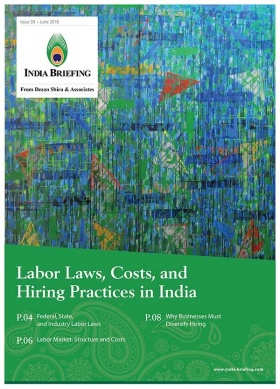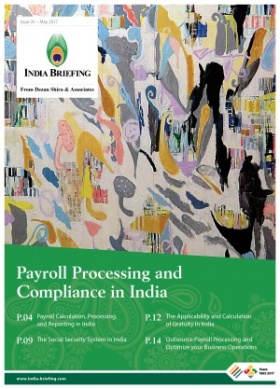#MeToo Movement in India: The Sexual Harassment Law and HR Best Practices
The sexual harassment of women at their workplaces is a rampant and distressing issue.
It not only undermines the confidence of women to work freely, but also leads to a corresponding negative impact on the performance and reputation of the organization.
As women’s fight against sexual misconduct gains momentum in India with the viral #MeToo movement, companies must take a more substantive approach to sexual harassment of women at the workplace.
In this article, we look at India’s law on prevention of workplace sexual harassment.
We also suggest common practices that human resource (HR) managers can undertake to ensure dignified and equitable work environment for women employees in their company.
Sexual Harassment of Women at Workplace Act
The Sexual Harassment of Women at Workplace (Prevention, Prohibition and Redressal) Act, 2013 (the Act) prescribes a system for investigating and redressing complaints against sexual harassment of women at the workplace. It also provides safeguards against false or malicious charges.
The major provisions of the Act lay down the following responsibilities for employers, to ensure a safe working environment for women:
- Display penal consequences of sexual harassment;
- Organize workshops and sensitization programs;
- Formulate an internal policy, charter, resolution, declaration;
- Form an ‘Internal Complaints Committee’ (ICC) where the number of employees is more than ten;
- Provide necessary facilities to the committees;
- Secure attendance of witnesses/respondent;
- Monitor timely submission of committee reports;
- Assist the woman in pursuing a criminal case if she so chooses;
- Maintain confidentiality of the inquiry process. The Act lays down a penalty of Rs 5,000 (US$68) on the person who has breached confidentiality; and,
- With sexual harassment being a crime, employers are obligated to report offenses.
What constitutes sexual harassment?
The Act broadly defines ‘sexual harassment’ as follows:
- Implied or explicit threat of harmful treatment in employment;
- Implied or explicit threat about the present or future employment status;
- Interference with work or creating an intimidating or offensive or hostile work environment; and,
- Humiliating treatment likely to affect health or safety.
It includes unwelcome sexually determined behavior that compromises physical, emotional or financial safety and security of a woman worker. This includes:
- Physical contact and advances;
- A demand or request for sexual favors;
- Sexually colored remarks;
- Showing pornography; or
- Any other unwelcome physical verbal or non-verbal conduct of sexual nature.
Where does it apply?
The definition of ‘workplace’ includes the following:
- Premises of all government and private entities that are involved in any economic activities, or work in education, entertainment, vocational services, sports facilities such as stadiums and sports complexes, health services;
- Any place visited by the employee arising out of or during the course of employment, including while in transit for work-related activities; and
- Societies, trusts, and non-governmental organizations, where people work on a voluntary basis.
Here, it must be noted that with respect to domestic workers, the Act considers even a house as a workplace.
What are the penalties for non-compliance?
Section 26 of the Act prescribes penalties for non-compliance and includes a monetary fine of up to Rs. 50,000 (US$679), amongst other penalties.
The penalty may extend to Rs 2.5 million (US$33,954) and imprisonment for every officer of the company who is in default for a term which may extend to three years or with fine in the range of Rs 50,000 (US$679), and Rs 500,000 (US$6,790).
If an employer repeats the same offense, authorities can double the financial penalty and/or cancel the registration of the entity or revoke any statutory business licenses.
Once a sexual harassment case is reported, employers must collect evidence and take action within three months.
If the aggrieved woman is not satisfied, she can approach the court under section 509 of the Penal Code, or report to police and revisit the complaint.
Implementing anti-sexual harassment legislation in India
To tackle the problem of sexual harassment at workplace, the Ministry of Corporate Affairs, through a notification dated July 31, 2018, amended the Companies (Accounts) Rules 2014. The notification makes it mandatory for private companies to disclose their compliance with the Act in their directors’ annual report.
Furthermore, the Act places responsibility on the appropriate state government to notify the district officer for setting up a Local Complaints Committee (LCC).
State governments are expected to monitor the implementation of the Act; the LCC is required to investigate complaints received from employees in cases where an ICC has not been constituted by the employer or the complaint is against the employer.
The Act is, however, not without limitations – it focuses only on women employees, and does not cover women in the armed forces and excludes women agricultural workers – the single largest female component of the workforce in India.
How can HRs ensure compliance with the Sexual Harassment Act?
HR managers are on the front lines when it comes to changing cultural attitudes about sexual harassment.
This makes it truly critical for hiring managers to learn from the #MeToo movement and take effective action against sexual harassment in the workplace.
Below we highlight some best practices that HRs can develop to ensure safe work environment for women:
- Update the official employee handbook that outlines the procedure that will take place when sexual harassment is being experienced at work. Include an unequivocal statement that sexual harassment will not be tolerated.
- Give out a clear, simple, and easy-to-understand description of what constitutes harassing behavior or conduct, including examples of the types of behaviors that are considered harassing at the workplace.
- Implement training for all to include more focus on gender identity and sexual orientation, and emphasize gender neutrality regarding who may experience sexual harassment.
- Sensitize male employees and reinforce confidence among women to come forward and file complaints.
- Stay updated on employment law changes where their employees live or work. HRs must also utilize professional associations, legal counsel and online resources to ensure that the company is compliant and aware of existing and upcoming legislative changes related to employee rights.
About Us
India Briefing is produced by Dezan Shira & Associates. The firm assists foreign investors throughout Asia and maintains offices in China, Hong Kong, Indonesia, Singapore, Vietnam, and Russia.
Please contact india@dezshira.com or visit our website at www.dezshira.com.
- Previous Article Section 377: LGBT Rights and HR Policy in the Indian Workplace
- Next Article An Introduction to Doing Business in India 2018-19 – New Publication from Dezan Shira & Associates









